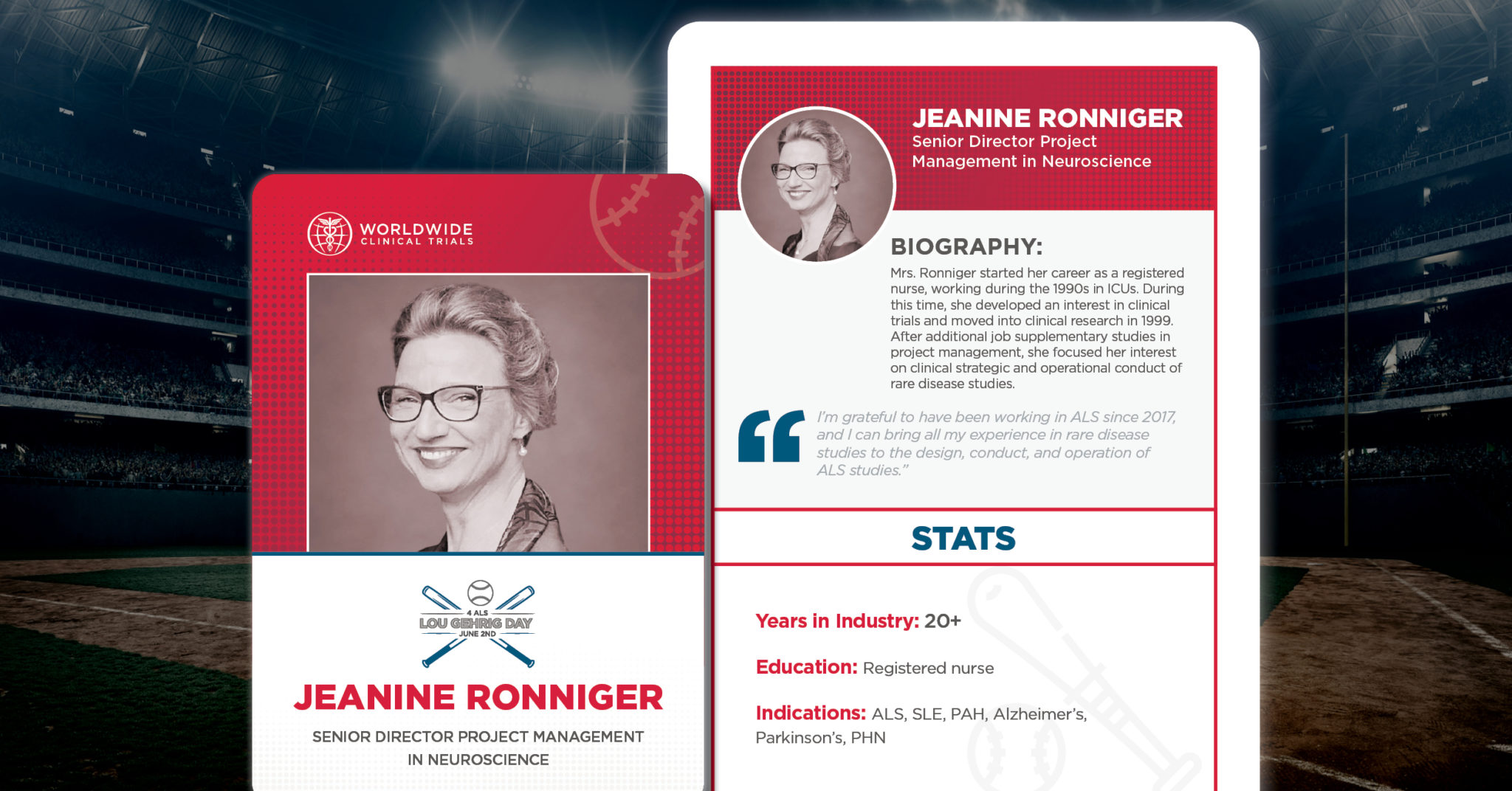
June 2 is Lou Gehrig Day, dedicated to promoting awareness about amyotrophic lateral sclerosis (ALS), also known as Lou Gehrig’s disease. At Worldwide Clinical Trials, our CNS experts are sharing their reflections on the importance of ALS research and what gives them hope for the future.
In this piece, Jeanine Ronniger, Senior Director of Project Management in CNS, shares how her experiences in nursing motivated her to move into ALS research.
I was and still am a passionate nurse. In my time working in hospitals, I was introduced to many rare diseases, but what touched me most was a young ALS patient. I saw how the disease affected him and how it influenced his day-to-day living. And I saw the pain and burden shared by his family and friends.
When I stepped into clinical research 20 years ago, I was keen to work on studies in rare diseases, like ALS. These kinds of trials have a different complexity than trials in other therapeutic areas. I gained a lot of experience and learned how to conduct such studies. I’m grateful to have been working in ALS since 2017, and I can bring all my experience in rare disease studies to the design, conduct, and operation of ALS studies.
From nursing to research
As a program and project global leader at Worldwide Clinical Trials, I work with sponsor clients who have invested in compounds that may be able to help ALS patients. I support them with respect to operational items of their trial design, in selecting the appropriate countries and investigative sites, and getting them up and running as quickly as possible.
My second focus starts when sites are chosen, as we get the staff trained to ensure that we have harmonized data coming into the study. This data needs to be carefully verified to ensure accurate evaluation to support the investigative product.
Patient support is a top priority
We see that these patients have difficulties in getting to the sites and carrying on with their study commitments as their disease progresses. Therefore, with our sites and clients together, we identify ways to support their participation, working with home nursing services, for example, or supporting the patients with transportation assistance. We do what we can so that they can stay on the study, even if they are unable to visit the site. They can still take their study drug at home, and we can still take care of the assessments. That creates a higher level of complexity for the study, but we are happy to take those extra steps.
Still learning
The tricky part is that we still don’t understand the nature of ALS; we don’t know where it comes from. This is another reason why ALS really matters to me. I want to see more success in ALS trials, and to have that success, we need to keep trying and keep learning.
It is my strong belief that by supporting clinical research, we can build a better understanding of the nature of ALS, so that we can bring compounds and drugs to market that, at the very least, slow the disease progression. Of course, it would be wonderful to bring about a cure for the disease.
Jörg Immendorff: Germany’s “Lou Gehrig”
In Germany, where I live, few people know who Lou Gehrig was. But there was a famous German artist, Jörg Immendorff, who passed away in 2007 from ALS. He made this disease more well-known in Germany because he went out and said, “I am suffering from ALS.” He gave interviews in his wheelchair and showed how much ALS affected his work and life during the stages of progression. It made people see what it actually means when you cannot use your extremities anymore, have difficulty swallowing, and can no longer breathe independently. His openness about his experience really resonated with the German people.
My hope
My hope is that I can draw attention to ALS for people who do not work in medical or scientific areas so that they will be moved to give their support financially, or even be moved to support ALS communities to help relieve the burden on patients. And hopefully, this will lead to new drugs that can slow down the progression or even cure the disease.
Learn more about Worldwide’s expertise in ALS clinical studies.


